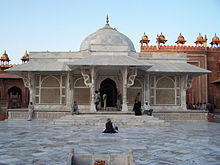Islam Khan I
This article relies largely or entirely on a single source. (October 2012) |
Islam Khan Chisti | |
|---|---|
 | |
| Born | Shaikh Alauddin Chisti c. 1570 |
| Died | c. 1613 |
| Resting place | Jama Masjid courtyard, Fatehpur Sikri |
| Occupation | Mughal General |
| Parent | Shaikh Badruddin Chisti |
Shaikh Alauddin Chisti (1570 – 1613; known as Islam Khan Chisti) was a Mughal general and the Subahdar of Bengal. He transferred the capital of Bengal to Dhaka and renamed it Jahangirnagar. He was awarded the titular name of Islam Khan by Mughal emperor Jahangir.
Early life
Islam Khan was a playmate of Jahangir in childhood.[1] Khan and Jahangir were foster cousins, Khan's paternal aunt, whose father is Salim Chisti was the foster mother of Jahangir. Shaikh Alauddin Chisti was Khan's cousin also. He was first appointed as the Subahdar of Bihar.[1]
Subahdar of Bengal

Islam Khan was appointed the Subahdar of Bengal in 1608. His major task was to subdue the rebellious Rajas, Bara-Bhuiyans, Zamindars and Afghan chiefs. He arrived Dhaka in mid-1610.
He fought with Musa Khan,[2] the leader of Bara-Bhuiyans and by the end of 1611 he was subdued.[1] Islam Khan also defeated Pratapaditya of Jessore, Ram Chandra of Bakla and Ananta Manikya of Bhulua.[1] Then he annexed the kingdoms of Koch Bihar, Koch Hajo and Kachhar. Thus he took total control over Bengal.
Death
After 5 years of ruling, Islam Khan died at Bhawal in 1613. He was buried in Fatehpur Sikri and laid by the side of his grandfather Shaikh Salim Chishti.
See also
References
- ^ a b c d Abdul Karim, Islam Khan Chisti, Banglapedia: The National Encyclopedia of Bangladesh, Asiatic Society of Bangladesh, Dhaka, Retrieved: 2012-10-21
- ^ Sen, Sailendra (2013). A Textbook of Medieval Indian History. Primus Books. p. 165. ISBN 978-9-38060-734-4.
Further reading
- Sir Jadunath Sarkar, History of Bengal, II (Dhaka, 1948)
- Abdul Karim, History of Bengal, Mughal Period, I, (Rajshahi, 1992)
